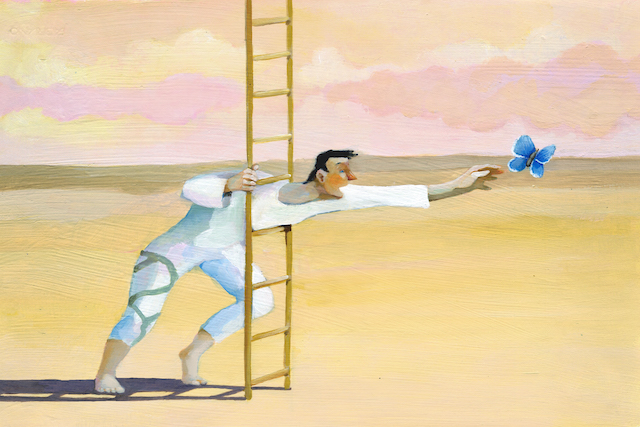"Dream, Dream, Dream! Conduct these dreams into thoughts, and then transform them into action."
- Dr. A. P. J. Abdul Kalam
"Dream, Dream, Dream! Conduct these dreams into thoughts, and then transform them into action."
- Dr. A. P. J. Abdul Kalam
27 May 2024
Living is a journey of growth and learning. It's never easy and is usually uncomfortable. I feel like I take the same step backward after every stride forward. Everybody has things that are impeding their growth, keeping them stagnant, and preventing them from embodying the next stage of their character's maturation. The ironic part is that we are the ones who are clinging to these memories. The energy of life wants to keep pushing us ahead, yet we cling to the past and things that might no longer be useful to us.
High Time To Take Risks ~ Then, why would we decide to give up our comforts? Because resisting the flow and clinging to things that no longer benefit us eventually becomes so excruciating and exhausting that we must let go. It's the only way to rediscover life and our inner selves, who are clamoring for space to grow. Giving it space to do so requires us to clear our brains and lives of things we no longer need. In other words, we must let go. Almost often, there is initial anguish, but eventually, like a light bulb to the sun, the pain is eclipsed by the joy and vitality that we have discovered and are now able to welcome into our lives.
Conducting Yourself To Direct a Flow Of Acceptance ~ There is no turning back once you start down a new path; the only way to change is to change permanently. Consider this for a moment: Can a butterfly emerge from its cocoon and continue to believe it's still a caterpillar? It may crawl around, unaware of its potential to take flight.

The Phase Of Letting Go Isnt Easy ~
(Source:Google Images)
Shoshin: The Beginner’s Mind
The term "beginner's mind," or "shoshin," refers to a notion in Zen Buddhism.When studying a subject, the concept of shoshin refers to letting go of your assumptions and adopting an open-minded mindset. When you are truly just starting off, your mind is clear and blank. Like a young child learning anything for the first time, you're open to learning and taking into account all available information. But as you grow more knowledgeable and skilled, your mind inevitably closes down. Your mindset shifts to "I already know how to do this," making you less receptive to learning new things.
Possessing expertise carries some risk. Information that contradicts what we already know is often ignored in favor of data that supports our current course of action. While we cherry-pick facts to support our present actions and ideas, we are actually speed-reading information and discussions in order to find something that aligns with our current philosophy or prior experiences. The majority of individuals prefer information that is validated over new information. The issue is that being an expert actually requires you to pay more attention—not less. Why? Because you have to listen extremely closely to pick up on the remaining 2 percent of the information when you already know 98 percent of it. As adults, our past experiences prevent us from viewing things in a fresh way. Zen master Shunryo Suzuki once said, "There are many possibilities in the beginner's mind, but there are few in the expert's."

This Concept Is Universal To Any Form Of Intreterpration ~
( Source: Google Images)
How to Rediscover Your Beginner’s Mind ~
Here are a few practical ways to rediscover your beginner’s mind and embrace the concept of shoshin.
Give up trying to add value ~ There is an overpowering need in many people, especially great achievers, to add value to those around them. This seems like a really good thing at first glance. In actuality, though, it can hinder your success because you almost never have a conversation in which you listen without speaking. When you're always adding value to others' ideas, such as "You should try this" or "Let me share something that worked well for me," you undermine their sense of ownership over their concepts. You cannot listen to someone else when you are speaking at the same time. Thus, letting go of the impulse to constantly give is the first step. Every now and then take a step back and simply watch and listen.
Let go of the need to win every argument ~ I came upon a wise piece by Ben Casnocha a few years back regarding the age-related decline in competitiveness. "Others don't need to lose for me to win," Ben said. This way of thinking meshes nicely with the concept of shoshin. Try resisting the need to correct someone when they say anything in a conversation that you don't agree with. You can win the debate even if they lose. It's possible to learn something new when you let go of the pressure to prove something. Start by asking yourself, "Isn't that interesting?" They have a distinct perspective on this.It makes no difference if you are correct and they are incorrect. Even if you don't always get the last say in conversations, you can still leave feeling satisfied.
Tell me more about that ~ I sometimes challenge myself to shut up and focus all my attention on listening to someone else. My preferred tactic is to say, "Tell me more about that," to someone. Whatever the subject, all I'm trying to do is understand how things operate and be open to hearing about the world from the viewpoint of others.
We are all idiots, but if you have the privilege of knowing that, then you can start to let go of your preconceptions and approach life with a beginner’s mind !